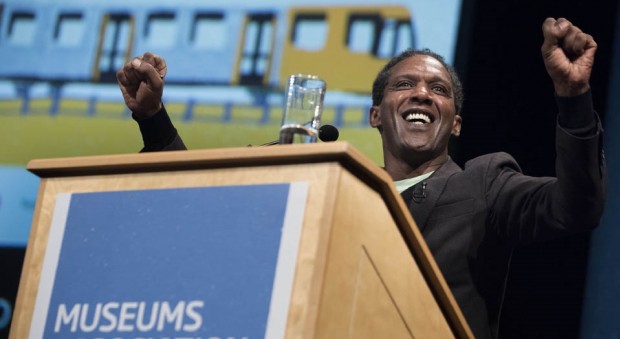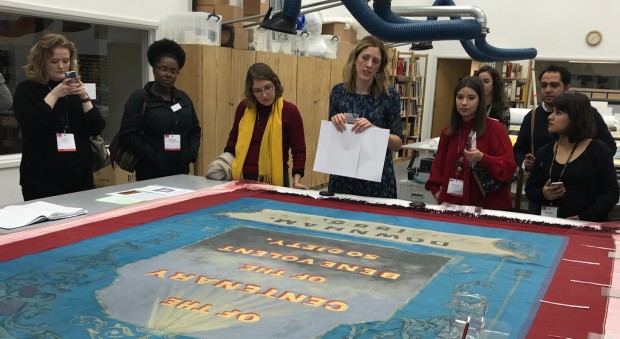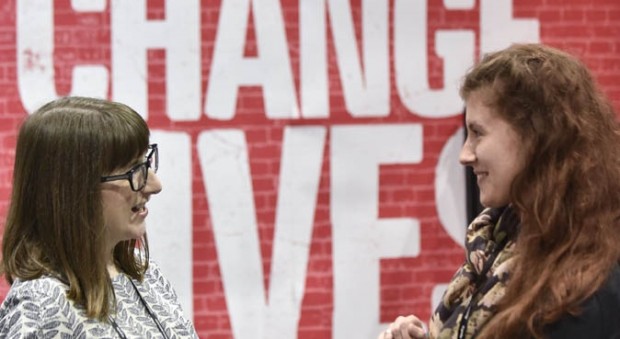On a bitterly cold Manchester morning, over 400 museum professionals from across the UK gathered in the city centre for the annual Museums Association conference.
An atmosphere of anticipation, with colleagues greeting each other warmly was somewhat sobered however by the welcome from Museums Association director, Sharon Heal, who gave a rather brutal awakening to the realities facing not just the UK museums sector, that has seen a drop in museum visits 2016–2017, but challenges facing the UK cultural industry more widely in reduced government and lottery funding, rising costs and crucially the unknown impact of Brexit.
Happily, poet and writer Lemn Sissay was on hand to raise spirits with the follow up keynote, and satirical tale of how even the smallest tasks in museums can be stopped in their tracks by bureaucracy. Encouraging the use of creativity in everything museum professionals do, he projected his point with passion: ‘artists do not have the monopoly on creativity!’ then leaving the audience red-faced followed this swiftly with ‘there’s a sound bite you can tweet!’

In the daily life of a museum, amongst the institutional structures and internal politics, it is easy to forget the wider picture of the sector: what makes museums relevant to contemporary society, how we can engage with the challenges that face society, and what museums should be collecting (and disposing of) now. Key to the topics of conversations at the conference were the broad themes of ‘audiences’, ‘collections’ and ‘workforce’: three huge and fundamental areas to a museum.
Addressing some of the issues for museum staff, a morning session discussed models for flexible working to restore a healthier work-life balance. Jocelyn Dodd, from the school of museum studies at the University of Leicester called for the need for an institutional change of perspectives on the regular ‘9 to 5’ working pattern: ‘You need time to make things, be creative, have other perspectives’. Also on the panel, Director of Unlimited, Jo Verrant’s disability requires her to take a nap during the day. Making her point in striped pyjamas, she talked about how flexible working can be hugely beneficial to team working if the communication is clear: ‘If my needs are met, I can do better in return.’

Growing support
In a later session in entitled ‘Growing support for heritage’, the model of visitor engagement at the National Trust was presented, an organisation whose visitor numbers have increased considerably in the last two years across almost all its 300 UK sites. Tony Berry and Jessica McGurk demonstrated their approach quoting their Director, Helen Ghosh: ‘We need to learn to love people as much as we love places.’
Jessica, Head of visitor experience also spoke about the challenges in turning the whole organisation’s attention towards ‘delighting people’ and the importance of ‘the first 50 yards’; a vital part of the visitor’s journey; ‘does every detail count? Can the place speak for itself? Are we stretching and surprising people? Are there reasons for returning?’ She also encouraged the use of seasonal and repeatable museum activities that drew on natural and existing structures that could add to a visitor’s experience and draw them closer to the organisation.
A later session had a completely different – almost parliamentary – tone. Ian Blatchford, Director of the Science Museum Group, Laura Pye, Director of Bristol Museums and Neil Mendoza, Lead Reviewer, Department for Digital, Media, Culture & Sport, presented and discussed the hard facts of the hot-off-the-press Mendoza Review, an independent and full report of 312 accredited museums in England. The report was commissioned to explore what government can do to assist in supporting the museums sector, comprising a workforce of 33,000 staff and 100,000 volunteers.

The very lengthy report having just been published was still being digested, however Laura Pye made a particular point about workforce diversity which struck a chord with the room; ‘Look around you: we are not representative of the communities we support.’
The conference concluded on the final day with a chance to see some of Manchester’s many brilliant and unique museums including guided tours of the Whitworth Gallery, People’s History Museum and the Museum of Science and Industry.
Beyond the wealth of diverse and insightful talks, workshops and hands-on sessions at the conference, the three days really gave a sense of the unending positivity and adaptability of the museums sector, using creativity to address current issues of uncertain funding, increased demands on space and income, and widening audience diversity.
Natalie Craven, public programmes officer
